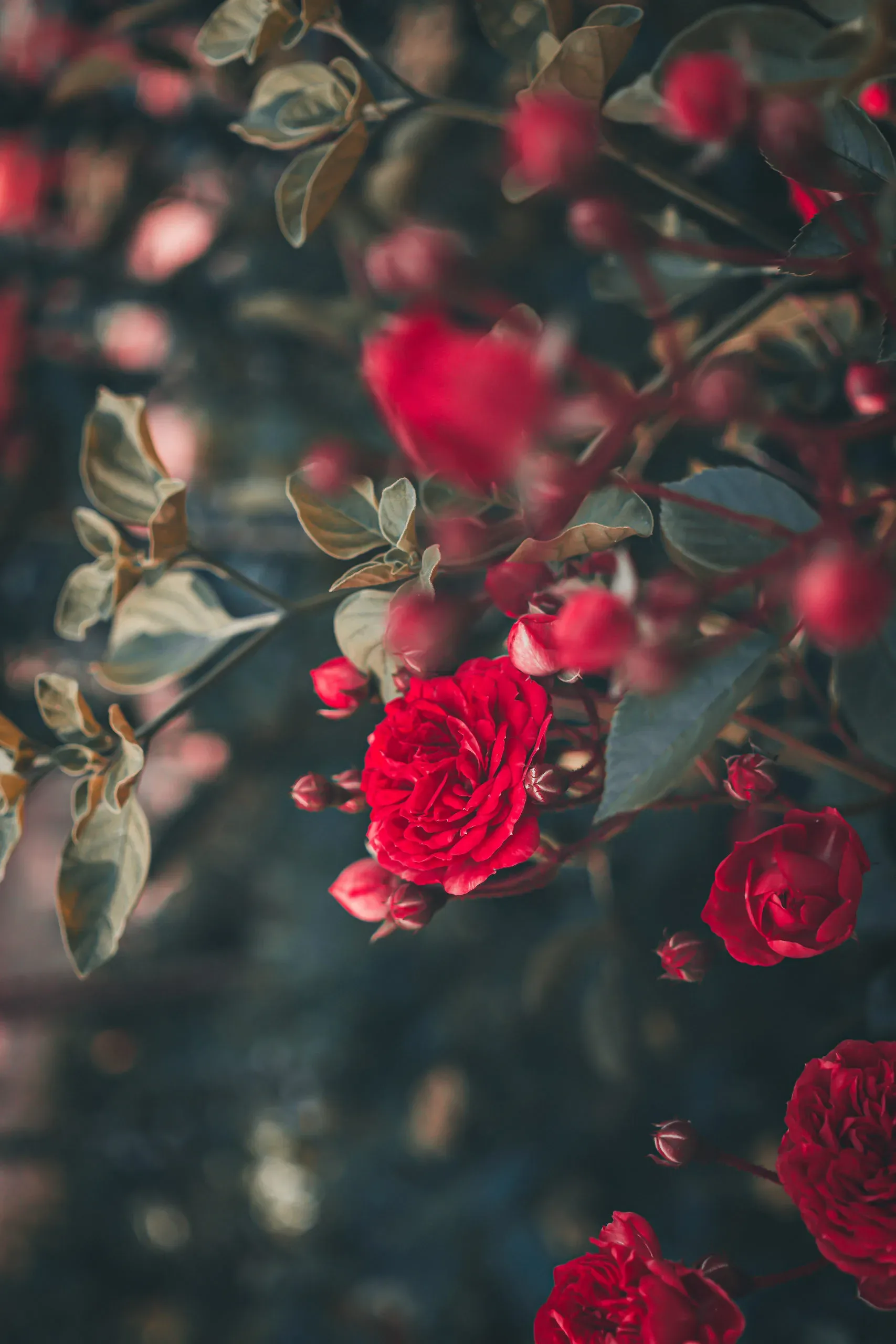
Planting Guides How to Plant Roses
Roses are very popular flowering shrubs that can be grown in many different garden situations. Modern varieties flower continuously from spring to fall and provide color in the garden all season long. With a little care in planting they will live for many years and make a wonderful show in your garden year after year. There are several kinds of rose bushes and we will give you some tips for making sure they all get the best possible treatment and care when planting them.
In a Nutshell
– Remove all packaging
– Water the plant in its pot
– Choose a suitable planting site for the needs of your plant
– Prepare the soil
– Dig a hole the depth of the pot
– Put the plant in its hole and replace most of the soil
– Water well, let the water drain away and put back the rest of the soil
– Put a mulch around your plant and water regularly
Getting Your Roses Ready to Plant
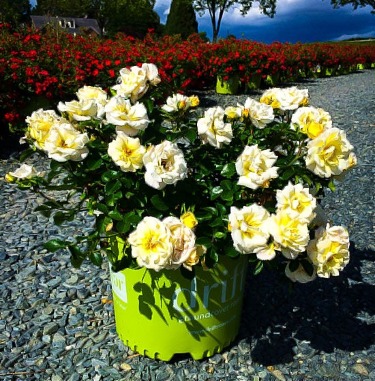
If you receive your plants in winter – which is a great planting season as long as the ground is not frozen – then of course they will have no leaves on them. That is normal – as soon as spring comes your rose bushes will send out fresh, new leaves and begin to grow.
Move your plant around by picking up the pot – do not lift it by the trunk or stem.
Care Before Planting Time
Your plants have been on a journey and they will be a little stressed, so place them in a shady part of your garden and give them a good watering. Do not put them in the garage, a shed or in the house, even if it is cold outside. Your rose bush will live happily in its pot for some time as long as you care for it. After a couple of days you’re your plants into a bright, sunny location. Remember to water every day or every second day, depending on how warm the weather is – do not let the pot become dry. If it does become very dry, place it in a bucket and half-fill the bucket with water so that the soil can soak completely.
Choosing a Planting Location
Roses like sunshine, so choose a bright, sunny spot with at least five hours of sunshine, and ideally more, each day. Roses do well in heavy soils that contain clay, but they don’t like to be in wet soil, so don’t plant them in a low-lying spot where it is always wet. Allow enough room for the spread of your rose and if planting in a group space the plants at about 75-80% of the spread. So if your bush has a spread of four feet, space your plants three feet apart. That way you will soon have a continuous group of plants, without gaps between them. If you are planting your rose bushes along the property line, set them back three feet since your neighbor can cut them if they spread into his property.
Preparing the Planting Site
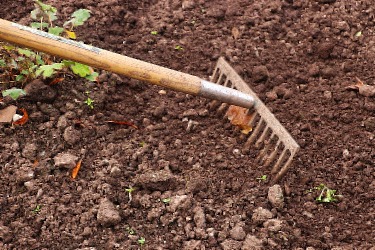
You goal is to make a large area of looser soil that the young roots can penetrate easily, getting food as they go and establishing quickly. You need to have an area at least three times the diameter of the pot, dug as deep as your spade will go. Add plenty of organic material to the soil as you dig. Almost any kind of organic material is good, among the best are well-rotted cow, sheep, or horse manure (if you can obtain them); garden compost; any ‘top-soil’ from a garden center; or if you have nothing else, peat-moss. A bucket of material, or even two, per plant is about right.
In addition, plants need fertilizer to help develop their roots. This can be rock phosphate or bone-meal or any kind of superphosphate. There are many ‘rose bush planting’ fertilizers available too and they all work well, so whatever is available will be fine.
Remove roots of weeds from the area and any stones bigger than your fist. Smaller stones can be left and it is not a good idea to sieve the soil to remove smaller stones they are best left in and can help with drainage.
Turn over the soil, mixing the organic material and fertilizer into it and then level it off and get ready to plant. Save some of the organic material you used to mulch your rose bush after planting.
Preparing the Plant
The evening before you are going to plant, give the pot a good soaking with water. If the root ball is dry when you plant, it may stay that way and cause your rose bush to suffer from dryness even if the surrounding soil is damp.
Digging the Hole
Now dig a hole in the exact spot where you want your rose bush to be, making it twice the diameter of the pot, but only just as deep. If you have dug the soil deeper than that, use your foot to press down the soil in the bottom of the hole, to form a firm base beneath the plant. This is to prevent it from sinking deeper than you want in the hole after you have planted it.
Removing the Pot
Take your rose bush to the planting hole and slide the pot gently off. You may need to tap the edge a couple of times to release the roots, but it should slide out pretty easily. Usually there will be plenty of roots filling the pot and the root-ball will stay together and not fall apart at all.
If it looks like the soil is going to fall off the roots, don’t worry, that is easily dealt with. If your plant has no leaves, then just let any extra soil fall into the planting hole. If your rose bush is growing, with green leaves, then leave it in the pot, take a sharp knife and cut around the bottom of the pot and remove the base. Then get someone to hold the pot together while you cut down the side of the pot. Tie a piece of string around it to hold together while you plant.
Planting the Rose Bush
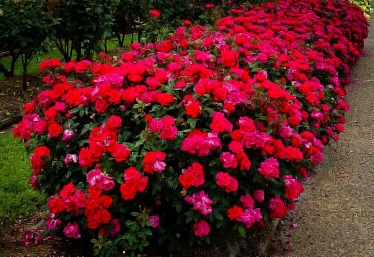
Watering the Plant
Now fill the hole with lots of water, letting it soak down into the ground and into the root ball. Use plenty of water and then wait until it has all drained away. This will give plenty of water around the roots, where it is needed.
Finishing the Planting
Now put back the rest of the soil, firming it gently down. Make sure you have only covered the top of the root ball with very little soil, no more than one inch. Make sure the soil is not sloping away from the rose bush, but flat, so that when you water it will stay around the rose bush, not run away. Some gardeners like to make a low wall of soil around the rose bush, at a spot about twice the diameter of the pot, to retain water. This is a fine thing to do, but not absolutely necessary. Put a layer of organic material over the whole root area, about three inches deep and then water everything thoroughly. Keep the mulch a couple of inches away from the stem of your plant
Staking Rose Trees
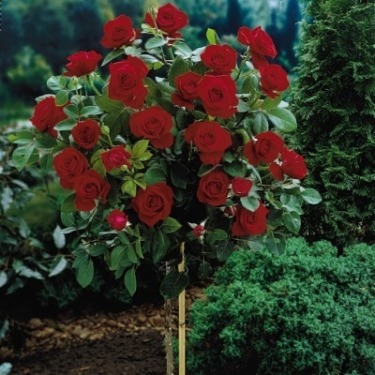
Planting in a Container
Roses are great plants for pots and containers, since their root-system is not large and they will live well for many years in a large pot. Make sure the container you choose has drainage holes – this is vital and if you can, don’t place a saucer underneath the pot as this can keep the soil too wet. Use a soil for outdoor planters from your local garden center.
Make sure your container is large enough for there to be soil beneath and around the root-ball. Water the container thoroughly after planting and then whenever it starts to become a little dry on the top layer. Roses in containers need regular feeding with a liquid plant food designed for rose bushes.
Leave your rose bush outdoors in the winter; it needs a period of cold weather. If you live in the coldest zone recommended for your rose bush it is a good idea to bury the pot in a corner of your garden for the winter to protect the roots from becoming too cold.
Follow-up Care of Roses
Replace the mulch over the roots each spring and use a rose fertilizer as well. In early spring, as the new shoots are just appearing, trim away any weak, thin branches and dead branches to encourage strong new shoots and lots of flowers. Cut off flowers as they die just above the first full-sized leaf to encourage new flowering growth.
So that is it. Your new Rose bush is set for a great life and will reward you with greater and greater beauty every year as it develops into a perfect specimen. A little care really pays off.
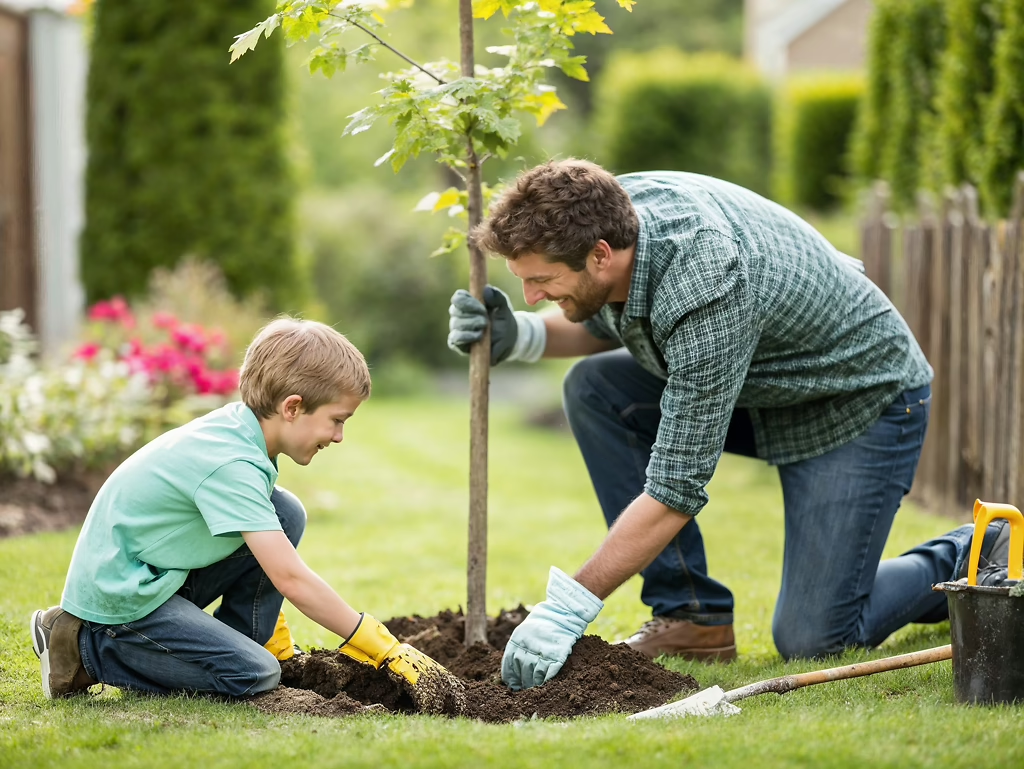
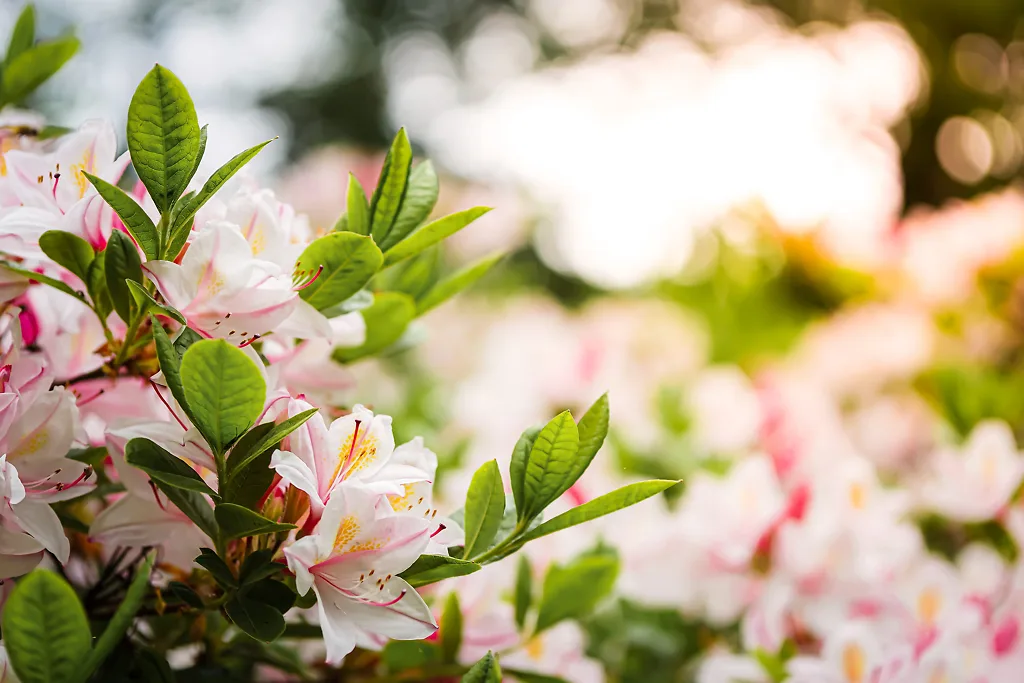






Comments 4 comments
I live in Charlotte NC. I want to replace three arborvities that are about 15 feet tall. One has died and the other two are in poor condition. There is not much sun there due to large trees. Is there a privacy shrub or bush that might do well in this situation. Thank you
Wonderful and very detailed directions on what and how to do. I have been reluctant to plant Rose’s, love them, but was always intimidated by the care and fragility of the types I’d seen. I will begin work on my backyard next year (blank slate right now) and would love to have roses in the garden. Seems like it might not be too hard after all.
So how wide of a space do I need to plant 6 rose bushes in a line and you say 3 feet off of neighbors property line should be enough?
Hi there I want you pre order for spring .. the coral knockout roses. Could you tell me how large the #3 containers are? I can’t seem to find this information